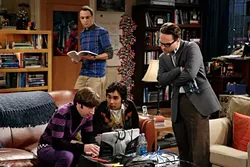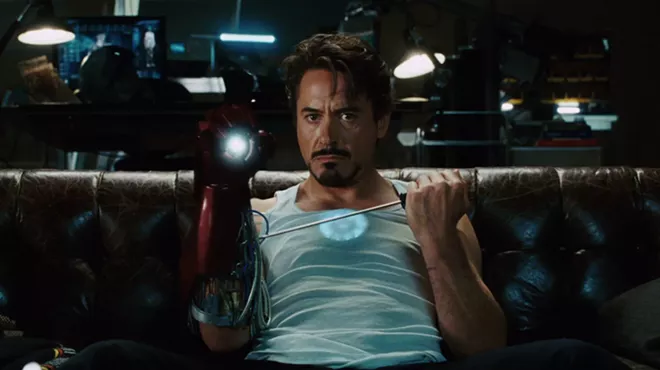Wednesday, October 13, 2010
How The Big Bang Theory can bang bigger
Community, with its sprawling paintball set-pieces and elaborate mafia movie homages, is the first type of nerd. It shoots for the moon. (Literally. Watch this Thursday’s episode.) The Big Bang Theory, however, is the second. It’s comfortable to just be what it is, forever and ever.
Makes sense. It’s a dynamo in the ratings. It’s a “pretty good show.” Why should I change?, Big Bang Theory says, slouched on the sofa. Change, after all is risky. But say Big Bang wanted to change. Say Big Bang wanted to be better. Since it is, fundamentally, a character-driven show, the key to a better Bang lies in tweaking the characters. Not a lot. Just a bit of sanding here and there.
1) Let Leonard be happy. There’s a time in many a comedy where the "straight man" turns into the "wet blanket man." By having Leonard constantly lash out at fan-favorite Sheldon, it turns him into a characterthe audience roots against. Leonard isn't funny when he's being cruelto Sheldon. Jim can be funny being mean to Dwight on The Office. But that's because Jim is an average guy. Leonard is supposed to be nearly as smart as Sheldon — but with social skills.
Instead, Leonard is funniest when he's geeky-happy, when you see him smile a dopey-smile at the mere mention of, say, Battlestar Galactica the board game. Let Penny critique Sheldon. It seems less mean coming from her. Have Leonard be the put-upon roommate who struggles valiantly to be a good guy, not the insult comic.
2) Beware the Path of Urkel. One of the most dangerousthings that can happen to a show is for a member of the ensemble — azany member of the ensemble — to become an extremely popularcharacter. It's understandable. TV sees a prize horse, and it will beatthat thing until it’s dead, then alive again, and then dead again, andthen dog meat.
This is the danger with our friend Sheldon.He's a brilliant, slightly askew comic creation. He is, truly, thepowerful weapon of the Big Bang force (Penny is the secret weapon.) Assuch, Big Bang has — rightfully — become moreSheldon-centric. Thus far, that direction has improved the show.Sheldon is the massive natural force that the other characters mustreact to. But any further and grave danger lies ahead for the Big Bang Theory.
Witness the path of Kenneth on 30 Rock,who went from a good-natured lovable character in some key scenes to aback-country bumpkin that, for some odd reason, became the NBC pagethat 30 Rock revolved around. Witness the path of Homer Simpson, whobecame ever more dumb and ever more to completely dominate the show inlater seasons. Witness the path of Steve Urkel, who became not only theentirety of Family Matters, and who not only started to build robots and create fantastical Nutty Professor potions, he actually began invading other shows.
So far, Sheldon, as he is, is a boon to Big Bang. As long as he remains how he is, and not wackier, not zanier, and not "zazzier." —-
3) Let Raj speak.The notion that a main character can’t speak at all around girls — unless he’s consumed alcohol — would grow stale across one gimmick.But now, it’s a gimmick that has followed the show across all fourseasons. Apparently, Raj’s silence is an unchangeable aspect of theshow’s DNA. I say bomb the show with gamma radiation, inhopes for mutation.
I understand that it’s a comic device tohave Raj whisper something into Wolowitz's ear. But I’ve never heard aparticularly hilarious joke come from that device. (That’s partly aproblem from the character of Wolowitz.)
You know what’s funnier than having Raj not talk around girls? Having him have trouble talkingaround girls. Like the problem actual nerds face. There’s massivecomedic soil that can be tilled — that has been tilled — from thestammering, flopsweat-stained malapropism-prone nerd having troubletalking around women. And sure, let Raj turn into a silver-tongued Lothario from a mere sip of alcohol. Going from stammer to suave,surely, is funnier than going from silent to suave.
4) Neuter Wolowitz. At least, metaphorically. A TV twitter account I follow talks about shows that use "Nerdface." Perhaps, that's making light of blackface, but I get his point. Sometimes TV treats nerds as these lisping, drooling, stinky, obese, acned, mother’s-basement-living, Warcraft-obsessed, never-had-a-date creeps. We're talking Comic Book Guy on the Simpsons, Steve Smith on American Dad, the Robot Chicken nerd, Jacob Ben Israel on Glee, and essentially everybody that works at the Buy More on Chuck.
But Howard Wolowitz is the most painful example. He's awkward, he's gangly. Like Jacob on Glee, he's Jewish, and he still lives with his annoying rasping Jewish-stereotype mother. He's got a weird laugh. And — here's the big problem — he's a bit creepy and sexually obsessed. We get it. These sorts of people do exist in real life. But they're rarely fun to be around in real life. In comedy you've got a pretty big hurdle to leap over to make creepy and gross likeably funny. We're almost always asked to laugh at Wolowitz like you laugh at the different kid in the cafeteria, not laugh at Wolowitz like you laugh at the pratfalls of a friend.
True, Lester and Jeff on Chuck are just as creepy. But here's the difference: You get the feeling Chuck loves the characters of Jeff and Lester. Big Bang despises Wolowitz. To ask Big Bang to begin to avoid despising its own characters is perhaps too much for a Chuck Lorre show.
But there are some very easy fixes for Wolowitz. Have him move out of his mother's house. Bring back his one-time girlfriend permanently. Stop letting him make sex jokes. There's an old saw that it's OK for beautiful people to make sex jokes, but not average or unattractive people. That's a horrible double standard. However, on TV comedy, it's usually absolutely true. So no more sex jokes Howard Wolowitz. Please, feel free to continue making sex jokes, Barney Stinson.
Oh, and please: No more Howard's-genitals-clutched-in-a-robot-arm’s-iron-grip-due-to-perversion-gone-wrong subplots. Thanks.
5) Tone down the laughter. Not the laughter at home, ofcourse. But the laughter from the studio audience. It's overloud. Andas such, to a generation that's not as used to laugh tracks, it'sinsulting. When the audience laughs at a joke we don't find funny, itmakes us downright angry. Some people dig laugh tracks. Some people don't. But Big Bang doesn't has to let loose braying laughter.
6) Replace the little whoosh sound that begins each cold open. This is my complaint, and my complaint alone. But I hate that little sound.
"Let's Fix" is a semi-regular feature in which I, a newbie TVcritic who's never constructed a coherent work of narrative fiction(assuming we don't count the "Three Fungi" series in fourth grade) in my life,tell professional veteran show-runners how to fix the artthey've spent their lives perfecting. You're welcome, seasonedprofessionals.
Tags: let's fix , television , TV , Image




















